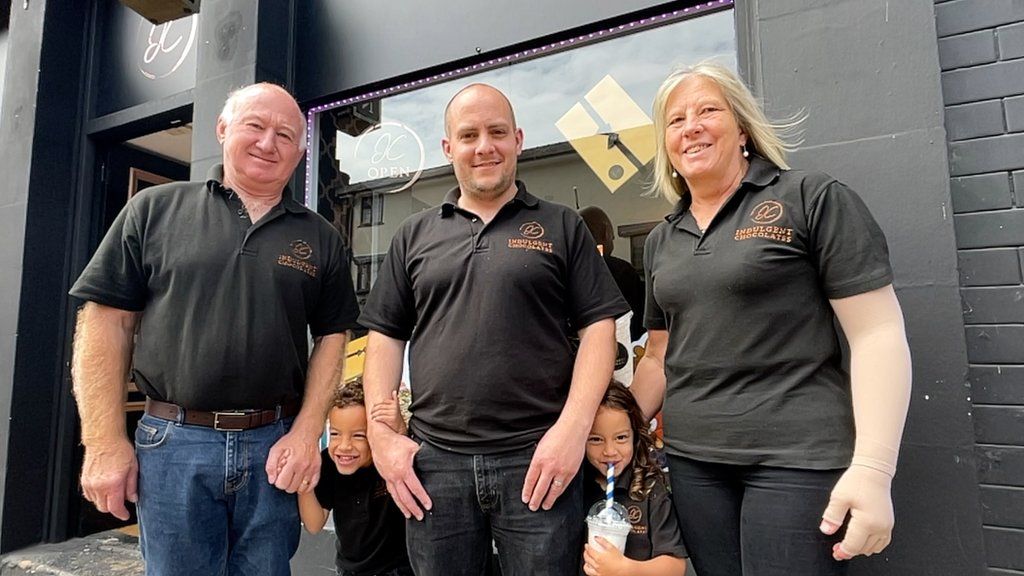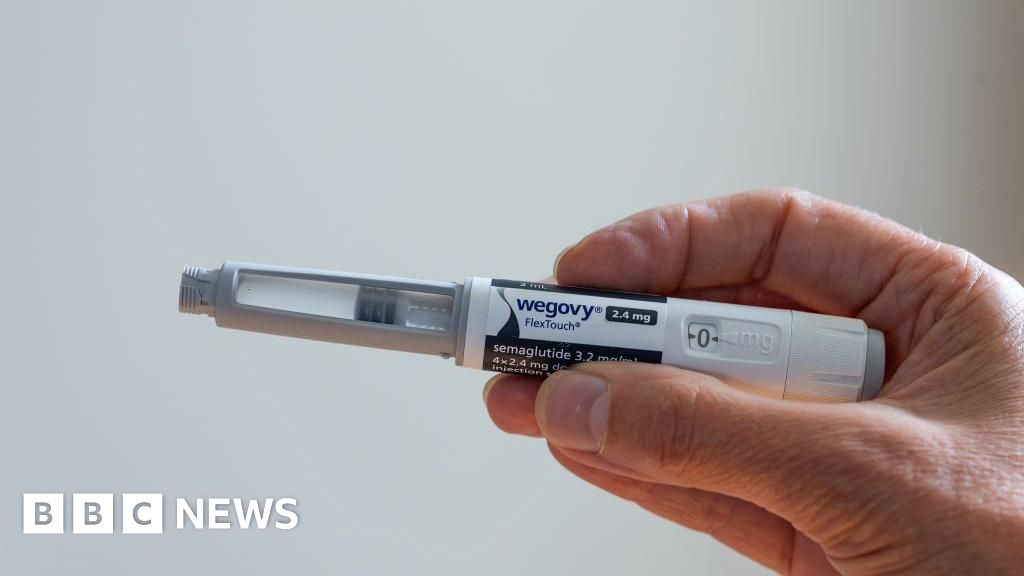ARTICLE AD BOX

Keith Tiplady has gone from motorcycle product designer to chocolate shop owner - taking his family with him for the ride
By Dougal Shaw
Business reporter, BBC News
The Covid-19 pandemic and lockdowns that followed led many High Street shops to close and lie vacant. But a new breed of first-time entrepreneur, which also emerged during the pandemic, is now filling some of those empty units - even if rising costs are posing a challenge.
"I didn't even think I'd be running a shop, never mind a chocolate shop - though I do love chocolate," says Keith Tiplady.
During the pandemic he lost his job as a project manager at a motorcycle factory in Leicestershire. He set up a business selling homemade chocolates online, making enough money to invest in his own shop in Ashby-de-la-Zouch in 2021, taking over a vacant former clothing shop.
The shop is his dream family business, with relatives helping out. One year on, the physical shop brings in more revenue than its online counterpart.
"We are going through tough times, with fuel and energy prices going up," says Mr Tiplady. "Chocolates and treats are not a necessity, so it's hard. But we've got to look further ahead, I hope this is my future."
Keith Tiplady thinks running a physical shop is, in some respects, easier than running an online one
He thinks the High Street is going through a "reorganisation", but will ultimately recover.
The shop brings him natural footfall. Customers can take away his chocolates and milkshakes, or consume them on the premises.
He says he found running his online shop exhausting, having to remind customers every day of his products with relentless social media posts.
"People come from outside of Ashby just to shop," says Mr Tiplady. "They like the fact they can browse multiple places."
Image source, Pi Guy
Image caption,Marty Duggan now has his own retail space and a place for customers to find him
Marty Duggan from Belfast started selling home-made pizzas during the first lockdown. He cooked them in his portable oven in his backyard, where customers came to collect them.
He drummed up interest on social media and tried to stand out by using locally-sourced ingredients, including Mozzarella. At first he took orders over Instagram messages, before building his own website to process them.
He had previously worked in restaurant catering. When he was put on furlough, this gave him time to give his sourdough pizza side hustle, called Pi Guy, a push.
He quickly found he had more customers than he could handle from his garden. So, after experimenting with some pop-up shop appearances, he decided to take a two-year lease on a unit in a new dedicated outdoor, covered space for traders called TradeMarket.
Image source, Pi Guy
Image caption,TradeMarket in Belfast hosts many food businesses started in lockdown
He was joined by many other first-time food entrepreneurs, he says, so they all took the plunge into physical retail together.
"It has been hard to get used to, because we have busy days and quieter days," says Mr Duggan. "So it is harder to plan, but the rewards of having more space and products to sell far outstrip the negatives."
"The market is definitely jittery at the minute due to rising costs," he adds, "and we probably have noticed a slight dip in customer spending."
However, he says he doesn't regret investing in a shop, even as recession looms. Quick service food firms typically do well during recessions, he points out, compared to more expensive dine in options.
Image source, Pi Guy
Image caption,Marty can fulfil larger orders from his shop kitchen
Overall, there were 9,300 fewer retail outlets on British High Streets in March 2022 than in March 2020, as shoppers switched to online stores, a recent BBC study of Ordnance Survey data found.
There was a marked decline in the number of banks, clothes shops and department stores.
However, there were some surprising winners that emerged from the era of social distancing. The number of tattoo parlours, beauty salons and places to eat and drink increased.
The findings illustrate the evolution of the British High Street, from a place to buy things to a place to do stuff - like get your nails done and meet friends for a coffee or a cocktail.
There was also a significant increase in the number of new businesses being created during lockdowns, driven by first-time entrepreneurs in the online space.
In fact, a Bank of England research paper found that these new businesses tended to crop up in areas where High Street shop closures were highest. Some of these new businesses had enough money to take advantage of favourable commercial rental prices.
"What the pandemic has done is make High Street space available where start-ups, in particular, have historically not been able to afford the rent," says Kien Tan, director of retail strategy at PwC.
But he adds a warning: "Being a bricks and mortar retailer has completely different operating economics and skill requirements to being an online retailer."
Katie Fairweather from Leigh-on-Sea in Essex worked as a sex and relationships counsellor for a major charity prior to the pandemic.
When she was put on furlough this gave her time to set up her dream business from home with her husband and their family friends.
Image source, Old Leigh Rum
Image caption,Katie Fairweather runs the business with her husband and family friends
Leigh Spirit Company sells drinks like vodka, rum and gin, all branded to tell the story of their community, inspired by ingredients found locally.
The business found success by setting up a website and then shipping orders to customers far afield, or delivering them personally to nearby customers. The team also persuaded local hospitality venues to stock their drinks.
A big part of the appeal of the new business for the Fairweathers was that working from home meant they could spend more time together, with their three children.
In February they found an old office space on the seafront and took up the lease to turn it into their first shop and licensed bar, selling their products. It runs in tandem with the online business. One benefit of having the shop, explains Ms Fairweather, is that local customers can buy online then collect from there, saving the business on time and delivery costs.
Image source, Leigh Drinks Co
Image caption,Previously the unit was used as an office
However, Ms Fairweather found the transition from home-based, online business to physical shop challenging.
"It felt like a real sacrifice, we didn't recruit any staff for the first few months as we adjusted to the new demands on time and money. We worked 60-plus hour weeks."
They now employ two staff and Ms Fairweather can be based in her "cosy office at home" once more.
Plans are afoot to open a second shop, but rising energy costs are causing a strain.
"A bar needs to be cosy to encourage people in, if they get cold they will leave, so it's a concern," says Ms Fairweather.
The shop doesn't have central heating so they use electric heaters, which are inefficient. And the shop's windows are old and draughty.
"But I think even with rising costs, having the physical premises is good for our business - for now we are committed to remaining open."
Like the chocolate and pizza shops, the Fairweathers' bar is in the hospitality sector, which appears to be bucking the trend of the declining High Street.
But it remains to be seen whether these entrepreneurs, who proved successful operating from home during lockdown, can find success with bricks and mortar, as energy costs rise and recession looms.
Follow business reporter Dougal Shaw on Twitter

 2 years ago
47
2 years ago
47








 English (US) ·
English (US) ·